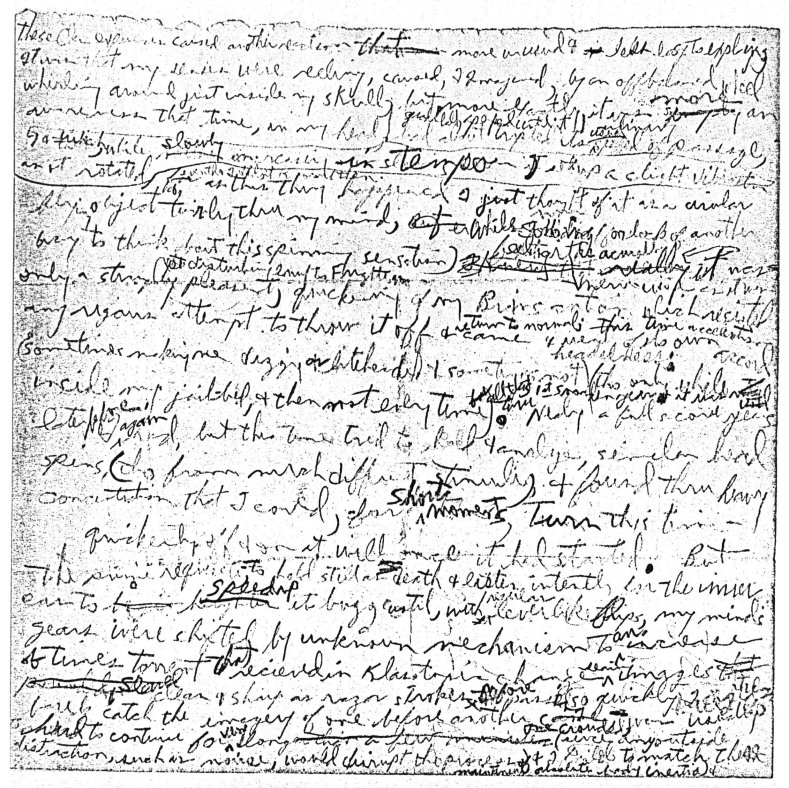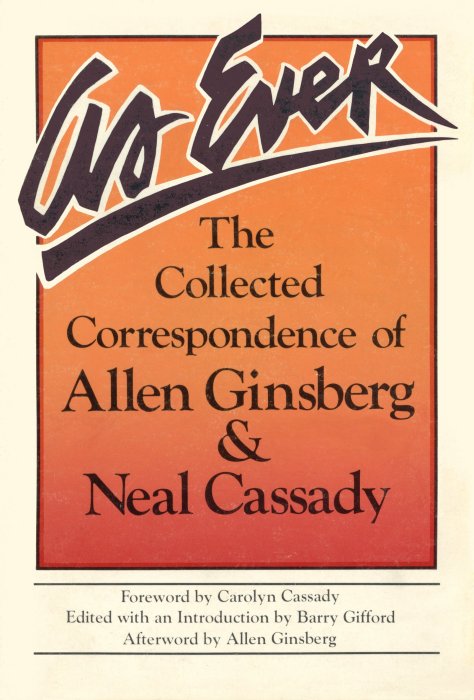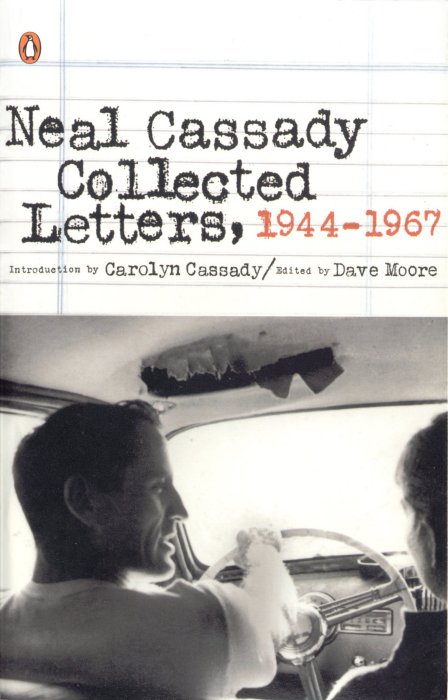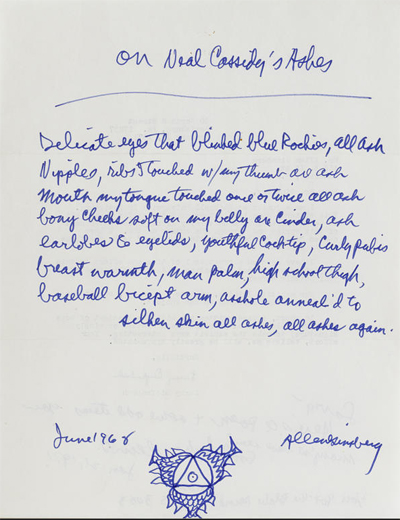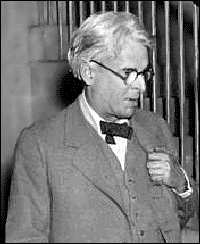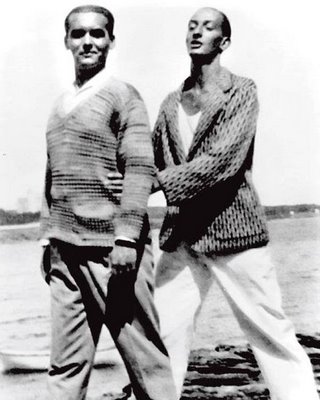![]() Allen continues his June 25 1981 disquisition on the performance and the reading out loud of poetry.
Allen continues his June 25 1981 disquisition on the performance and the reading out loud of poetry.
AG: One problem is that some people have an idea of poetry which is mono-tonal. Like Richard (Poe),who (originally) asked the question, reads poetry in a monotonal (way), one tone – and a lot of people do, Somehow when you fall into reading poetry you just get into some kind of half-chant, half-croon, half poetical-sounding trance voice (which is not exactly a trance voice but just a conventional voice for poetry) and you get stuck there. One reason people do that is that they’re afraid (that) if they fall off that plateau and have to vivify the language with different tones and make it sound like it’s a real talk, they’ll all be embarrassed to find out that it isn’t their own speech, and that it’s unpronounceable as if it were real talk. So that it’s a “refuge of a scoundrel” [editorial note - Allen is, of course, quoting Samuel Johnson here], that is, it’s a way of.. well, either hiding the fact that you don’t know what emotion you want in there, or there is no real emotion in there, or maybe the emotions are so strong you just might burst into tears so you just keep it on a montone It’s also amazing how intelligent people, who are completely conscious of other gestures, when they read poetry get into a croon or a sing-song that doesn’t have a varied tone (which means that their whole approach to poetry, from the bottom, all along, was a little bit blind. They didn’t realize they were actually talking. They thought they were doing something else, besides talking strongly as if they were talking to somebody real). So if you’re talking as strongly as if you’re talking to somebody real, then there should be some variation in tone in your poetry. Well that was a footnote. Yeah?
Student: Will reading-out-loud help you with that?
AG: Pardon..?
Student: Will reading-out-loud help you with that?
AG: Well, that’s what we’re talking about! – We’re talking about reading-out-loud.
Student: I mean, like…
AG: Yeah, I think so (though, sometimes I get embarrassed reading out-loud to myself – I don’t get so embarrassed reading out loud to other people, because it’s real).
Student: You couldn’t get in the same (quality of listening to the) poem, reading out loud, as you could to yourself…
AG: Reading? what?
Student: I mean..should you.. maybe let somebody else hear you reading out loud?. Could you get the same qualities of listening to yourself.
AG: Well, I think the ideal condition is singing in the shower. You know, singing, when you’re taking a shower, to yourself, because you really let loose. Nobody’s listening to you so you make all sorts of vocal tones that you wouldn’t normally allow anybody to hear that you were capable of in your body.
Student; Yeah
AG: All sorts of gaga squiggles and hoops. So you have maximum expansion in the shower. Also, maybe, physiologically, because the hot water and your body’s relaxed and then there’s the sound – the echo-box, the echo-chamber effect. Or on bridges is a convenient place (like on the George Washington Bridge or the Brooklyn Bridge) when nobody’s around. I think I mentioned to somebody my favorite place was the walkway bridge overpass over 125th Street on Riverside Drive in New York, which is a quarter-mile walk and there’s absolutely nobody there but thundering cars and thundering iron, and you can make all the noise you want and nobody will hear more than an ant’s forefoot. Yeah?![55.rivviaduct2]()
AG: Yeah
Student: …and they both have very sing-song-y types of presentation in the things that I’ve heard, (and now you…)
AG: Because my theories are coming out of Pound.![Ezra Pound Ezra Pound]() [Ezra Pound]
[Ezra Pound]
Student: That’s why… that’s why I bring up Pound, because, I’m surprised. Yeats, I can understand (given) the sort of meter that he used, but Pound…
AG: Well, Yeats is coming out of the nineteenth-century and what was called “Celtic Twilight” and “dim mists of years” [editorial note - Yeats doesn't actually use this phrase, but..] and “I will arise (and go) now and go to Innisfree..”. As Pound points out, Yeats always wrote with a “chune” in his head (he always had a little tune in his head when he was writing). So there was actually some tone and rhythm – basically the rhythm, a vigorous, muscular rhythm, relating to an actual tone that recurred on itself. It wasn’t as if he were dryly counting syllables, he was actually fitting it into an old Irish tune (at least, in his inner ear, there was some variation of pitch or tone).
Student: Uh-hmm
AG: The other thing, there was that tradition that he was coming out of, the Irish bard chanter. The chanting of an Irish bard. You know anything about that?
Student: Yeah. Yeah.. He was really.. He considered (it) a revival, and what he was doing in Irish poetry was (to) try and get back to the old, the old epics and the ballads and really try to bring back the heroic
AG: Yeah
Student: Because in this.. in this record, he had said.. he made a lot… he made an enormous effort to make this thing poetry..(and) he’d be damned if he’d read it as though it were prose.
AG: Right
Student: And he said it, like, “I will arise and go..”[Student adopts Yeats’ oracular tone] ..”go now, and go to Innisfree..”, like that.
![W B Yeats]()
[W.B.Yeats]
AG: Yeah, I remember the record. I don’t have it here and I haven’t played it for years, but he does roll his “r”’s..quite a bit, and he does get a lot of color into the vowels – “I will arise and go..”, with a quaver I remember, “I will arise (and go) now and go to Innisfree..” – It is monotonal, but it has lots of oomph in it, more from chanting, I think, bardic chanting. Yeah?
AG: Ballads and everything?
Student: Yeah, just everything.
![The Penguin Book of Irish Verse]()
AG: Then Pound was imitating Yeats. Pound was Yeats’ secretary, and got turned on to vocalization somewhat in studying with Yeats and being Yeats’ secretary, out in the country, 1912 or so. He was living with Yeats, acting as Yeats’ secretary, carrying on a large correspondence, including a huge correspondence with James Joyce,another Irishman, another singer – tenor? baritone? – tenor, I think. Pound has different tones during different decades of recordings. The tones of the (19)50’s are irritable, but very precise. Tending toward, “And you, beautiful Walt Whitman, sleep on the Hudson’s banks” ["Y tu, bello Walt Whitman, duerme a orillas del Hudson" - from Garcia Lorca's ""Ode to Walt Whitman"] – some kind of heavy, almost nasal, anger, in recordings made at St Elizabeth’s Hospital [the Caedmon recordings]And, in 1957, there is a small recording, which I think I have here, made in Milan, just after he got away from Washington DC, away from St Elizabeth’s Hospital, made at the University of Milan, with some kind of electronic music in the back, where his voice is booming, or more of a booming voice, but a booming monotone. And then, there is a later recording, made in the mid-(19)60’s, when he was in his seventy-eighth or eightieth year (seventy-eighth or ninth), where he’s got this old man’s paper-thin voice with whispers. AG: Well, some Confucian Odes and some of thePisan Cantosand the later Cantos, Cantos that we have in here [Allen points to his Expansive Poetics anthology] – the Cantos that we have in this collection are on record, where there’s more vernacular tone, more ordinary-speech tone. He’s gotten over his madness and his anger and his irritability and his force – anger force – and he’s beginning to talk more like an old man, recollecting. But then, the thing that I’m throwing into the pot here, there’s the appreciation of the vowels and the rolling “r”’s of the Irish bullshit artists, and the hang-over of nineteenth-century oratorical monotone in early Pound, but, simultaneously, there’s the practice and idiomatic speech of (William Carlos) Williams. And it’s actually Williams who contributes as much as anybody, in actual pronunciation, to the awareness of tones. If you ever hear Williams’ recordings. Williams has some really great recordings he made as an old man of poems from “Pictures From Brueghel” and “The Desert Music”, and in that, you realize he’s just this wheedling old man, with his funny half-feminine voice half the time. He’s old and he can hardly pronounce it and the voice is coming out of pure sincerity, right out of his heart, like that. And coming up with the high tones , as almost, a bird-like.. I don’t know “oodling”,tones, like The Beatles’ “I want to hold your ha-an-an-and”. That tender oodling tone that the Beatles came out with, Williams came out with, as an old man might come out with that. Or, if you listen to Tibetan lamas, they have a very strange voice, which is (a) quiet, restful, calm, well-grounded voice that comes from their body, but, at the same time, extremely tender, in discussing the fact that we’re mortal, and everything is transitory, and that existence contains suffering, and actually we have no soul. So, the explanatory lyric voice, you might call it, or explanatory high-pitch, tender high-pitch, tender explanatory high-pitch, Williams had quite a bit. You know what I’m talking about? – that old man’s high-pitched tender address? – “Little girl, are you going home?”![Animation Art:Production Cel, Beatles Yellow Submarine Old Fred and Ringo Starr ProductionCel and Drawing Group (United Artists/King Features, ... (Total: 2Items)]()
Student: You know what.. You remember, in “Yellow Submarine”, the old man ["Old Fred"]? AG: I forgot.
Student : Oh, I don’t know, when they start saving Pepperland. There’s an old man who’s covered with apples ... AG: What kind of voice?
Student: ....you know, and he’s telling them about the old man that looks.. so much like him.. and...
AG: Is that a sort of cracked Scotch type of... is that a cracked voice?
Student: No, it’s real high-pitched...
AG: Yeah.![00n/29/ARVE/G2004/059]() [William Carlos Williams]
[William Carlos Williams] Student 2: . I think that…following your idea, that the tone corresponds to the functional meaning of the poetry, that Williams has a tremendous amount of tenderness in his poems
AG: Yeah. Yes.
Student: . .(and) it naturally would come out, of course.
AG: Yeah, so what he said, what he took out of it was, I think, the key – the vocal tone is equivalent to the emotional note.
Student: Hmm
AG: Once you understand that, then of course it then becomes much more self-revealing and more a matter of vulnerability for you to be able to pronounce your poems openly, with the actual feelings in it. Yeah?
Student: Allen, my room-mate is about seventy-percent deaf..
AG: Yes.
Student: And he says, if it gives all the clues of being very boring and mundane, he just turns off the whole process
AG: Um-hmm
Student: He says, one thing he does listen to is that..that intonation, to see if they’re saying what they really..what they really mean to say.
AG: I guess “intonation” is the word. In-tone-nation. In-tone-nation. That’s a good word, yeah. In-tone (the internal tones, the internal tones you make when talking). What does intonation mean? – I guess, exactly that - the tonal quality. I hadn’t thought of that word. Okay, so you’d pay attention to the intonation, and the intonation would be equivalent to the emotional..what?...the emotional..?
Student: Quality? meaning?
AG: (Well), content, I suppose.
Student: Really?
AG: Intonation is emotional content. Intonation is equivalent to the emotional content, or to the emotions moving, the moving of the emotion, rising to climax and falling. If you pronounce it with intonation, then you’re vulnerable because you’re showing your heart.
So I would say you take Pound’s consciousness of language (it’s Pound that pronounces things very beautifully – he has a line, “They will come no more,/ the old men with beautiful manners”, (and beautiful speech). [from "Moeurs Contemporaines - VII - Vecchii"] He was talking about Henry James, actually, after World War II. - “(And the end of this you may be sure)"that war is the destruction of (good) restaurants." [from Cantos LXXIV and LXXVI] - "They will come no more the old men with beautiful manners”. He’s talking about himself as much as anyone else. And so the late recitations of the Cantossounds like one of the “old men with beautiful manners” speaking, with (a) whispery, paper-thin voice and very perfect pronunciation of consonants. Conscious talk. In other words, conscious pronunciation, rather than so speedy that you don’t even hardly recognize that you’re talking, nor appreciate the intelligence of your listeners, (and) that they might appreciate your intelligence while talking, also. Where does that get us? I don’t know how that might apply to trying to read Lorca, which is a translation from his original intelligent Spanish into dumber English. [Allen returns to his Lorca teaching – see here
and, noticeably, later remarks
"If you treat almost every word as if it had some meaning, or if you can find some significance for every syllable, then you can have a complete musical variety of syllabic chimes, line-to-line. Though the tendency is to (do it) sing-song. But if you can find at least one word in a line that has a punch, has a tonal punch and you put that through, then you can keep every line alive and you can keep everybody listening."
"Yeah, just exaggerate the tones. Usually for reading, one does have to straighten one's spine. That's the secret - that, in order to get an unobstructed breath, you have to sit up straight, because, otherwise, if you're hunched over (which is more or less of a defensive posture and a withdrawal - like going back in the womb) there is not the possibility of expanding the chest and resonating outward from the inside out and projecting the voice. There's a need to hold the sternum, which is this part of the breast [Allen points to it] up, and shoulders back, and relax the belly, so that the voice can come out of the middle of the body. That's another thing I forgot about in terms of the physical placement of the voice. You actually can speak from the heart, literally, it's not a metaphor, it's a physiological fact that the voice can resonate from the breast area, rather than from the top of the head. But in order t0 do that you've got to sit up straight and lay it out."
"Yeah, I've been thinking (about this) for years, and people have asked me, and this is about time (I think it's something) that we should be teaching here [Naropa] - pronunciation. Vocalization. We should be actually doing vocalization in class, instead of just referring to it."
[Audio for the above may be heard here, starting at approximately twenty-two-and-a quarter minutes in and concluding at approximately thirty-seven-and-a-quarter minutes in. The three additional quotations come from later in the class - see here]
